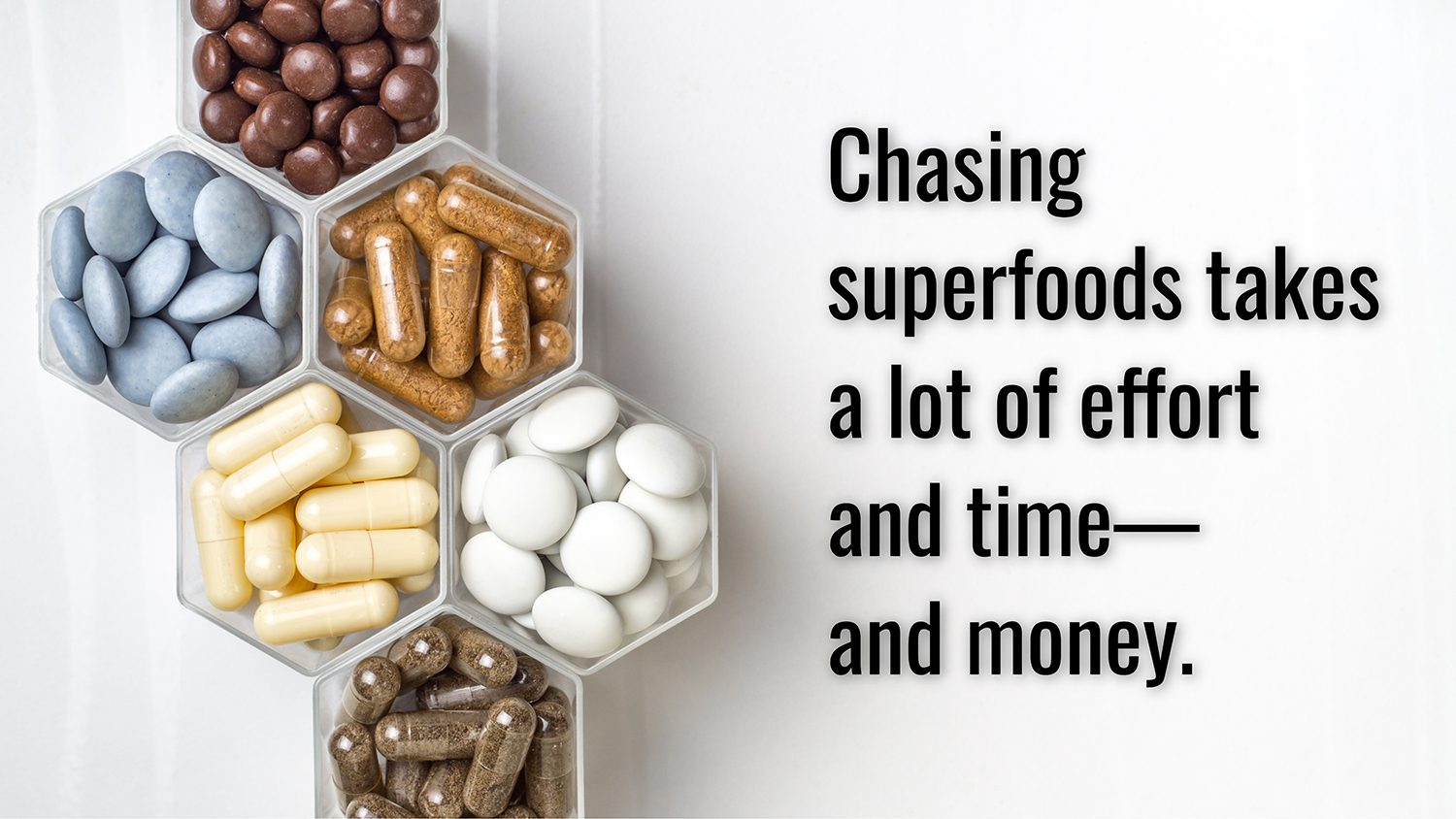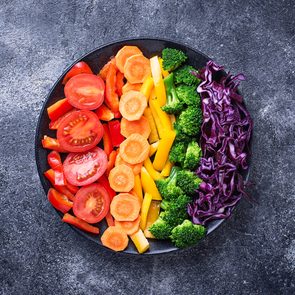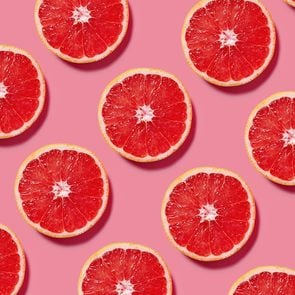Are These Health Food Trends Doing More Harm Than Good?
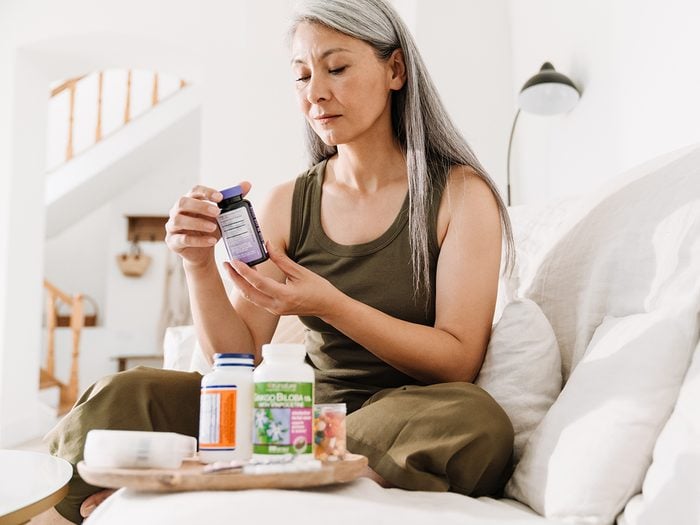
In this excerpt from her book, Growing Young, science journalist Marta Zaraska debunks the supposed health benefits of supplements, superfoods and exclusionary diets.
A 55-year-old Indian national living in Canada, let’s call him Mr. Gupta, needed a coronary bypass. He wanted to have it done in his homeland, so he travelled all the way to Punjab, India, to have the surgery. At first, the procedure seemed to go well, but as time passed things started to go downhill in the operating room—Mr. Gupta just wouldn’t stop bleeding. The doctors transfused one unit of plasma, then another. Several interventions later, the oozing finally subsided, but when the doctors checked the patient some time after the surgery, they noticed his chest was covered in huge bruises—a rather disturbing photo of them can be now seen in a scientific paper the three cardiologists published in 2016 to document the case.
Later on, the doctors discovered the likely reason for Mr. Gupta’s mysterious bleeding: his supplement pills. Before the surgery, Mr. Gupta was in the habit of taking three over-the-counter omega-3 and oleic acid pills per day, and a garlic-thyme supplement twice a day. Considering the effects such products may have on platelets clumping together to form blood clots, the doctors concluded they’d found the likely culprits. Mr. Gupta finally recovered, but his doctors commented in their later journal paper that the case “highlights the dangers of some dietary supplements.”
Each year in the US alone there are an estimated 50,000 serious adverse events connected to supplement consumption. In 2013, as many as 20 percent of cases of drug-induced liver injury were due to herbal and dietary supplements, up from 7 percent in 2004. What’s more, those patients unlucky enough to have a liver failure after taking herbal pills are much more likely to require a transplant than are those who have damaged their liver by taking prescription drugs.
One supplement that is now making the rounds of the internet as a cure-all miracle is an extract from a Pacific islands plant called kava. It’s supposed to work as a natural anti-anxiety medication, stop the growth of breast cancer tumours, treat depression, and protect you against Alzheimer’s disease. The claims are wild, with basically no scientific evidence to support them.
What we do have evidence of, though, is that kava can damage the liver. Health authorities in several countries including Canada, the UK, and France have reported at least 25 cases of liver toxicity, including liver failure, after ingestion of kava. Products containing kava have been banned in some of these countries, such as the UK, while Consumer Reports placed kava on its list of “Supplement Ingredients to Always Avoid.” Still, in some health junkie circles, kava remains highly popular. Across the US, well over 100 specialized kava bars have opened in recent years, with more than 50 in Florida alone, offering juice-based and coconut water-based kava drinks.
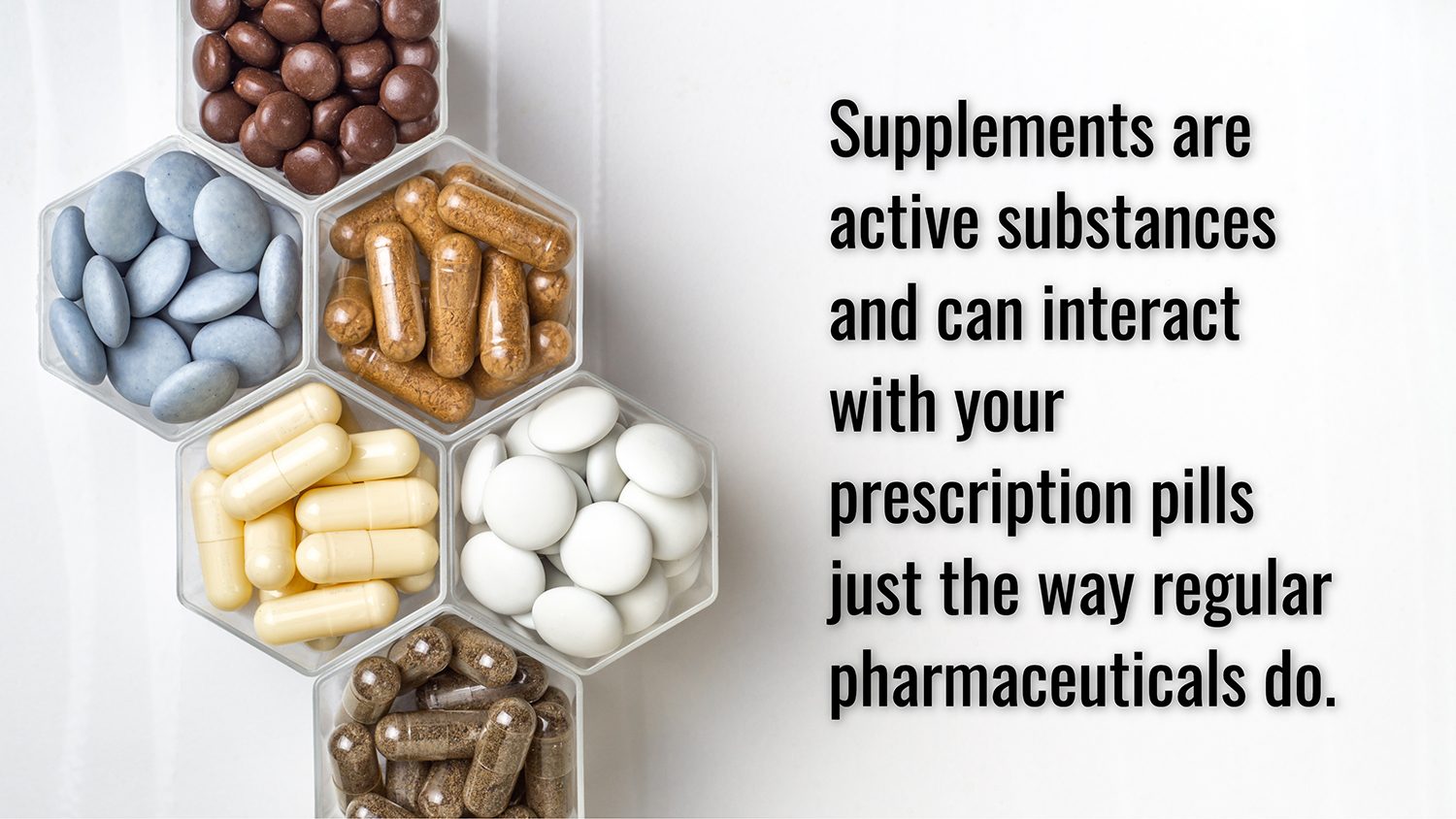
The Problem With Supplements
So how can it be that something so innocuous-sounding as an herbal or dietary supplement can be so dangerous? First of all, about a quarter of supplements may have contaminants in them introduced in the production cycle—heavy metals, for instance, such as lead or mercury. Or pharmaceuticals. As of 2018, over 750 supplements have been found to be tainted with pharmaceuticals, including amphetamine analogues or alprazolam (Xanax).
Second, we may simply not know how exactly the supplement works in the body. Prescription drugs have to undergo lengthy safety trials. Supplements don’t. They are also practically unregulated—in the US, the FDA does not review their safety before they end up in shops. In the European Union, supplements are considered a “foodstuff,” and their control is very difficult, especially considering that many of them are sold online. In Canada, “natural health products”—vitamins, minerals, herbal remedies, and so on—must be assessed for safety by Health Canada, but the process is primarily paper-based, and the evidence submitted by manufacturers doesn’t have to be particularly robust.
Another issue is that of drug interactions and side effects. Supplements are active substances and can interact with your prescription pills just the way regular pharmaceuticals do. And yet, one in six people who take prescription drugs also take at least one dietary supplement. To get into trouble you don’t even have to go as far as the futurist Ray Kurzweil, the very same one who downs metformin to boost his longevity, who takes about 90 other pills a day, including green tea extract, echinacea, and gentian root. Two wrong substances mixed together can be enough to cause problems. St. John’s wort, for example, can cause interactions with high blood pressure medications and with oral contraceptives.
Large, dangerous doses are also a common problem—both with herbal supplements and vitamins. Some toxic substances are basically poisons at high dosages yet beneficial to health in small quantities. This effect, known as hormesis, applies, for instance, to many phytochemicals, compounds that plants produce in order to kill or deter pests. Examples of phytochemicals likely known to many nutrition buffs include glucosinolates (behind the health benefits of broccoli) and tannins (red wine). Although it’s basically impossible to overdose on broccoli due to the physical limits of your stomach—I challenge you to eat more than two or three heads—phytochemicals found in supplements are another story. Some green tea pills sold online in the US, for example, contain a minimum of 274 milligrams of phytochemicals called catechins per pill. The label says you should take three of these a day, which would bring you to a dosage exceeding what the European Food Safety Authority considers a liver damage risk.
Same thing goes for vitamin pills. High doses of vitamin C have been linked to renal failure, and high doses of vitamin E to cancer. According to meta-analyses of studies, taking 400 IU or more of vitamin E per day can actually shorten your life, and so can beta-carotene supplements and vitamin A. Multivitamins aren’t much better, either. In a study of over 80,000 American physicians, those who took multivitamin pills had a 7 percent higher risk of dying from cardiovascular disease than those who didn’t go for such supplements.
One reason for the damaging effects of vitamins may lie in the tricky workings of antioxidants in our bodies. Although often touted as quasi-miraculous substances that can wipe up dangerous free radicals and prevent aging, in reality the antioxidants that we swallow as supplements have much less rosy effects on our cells. More and more research suggests that free radicals are an important part of the body’s repair mechanisms (that’s why exercise is good for you—it produces free radicals). If you dump too many antioxidants in a purified form into your cells, they may end up disrupting these important repair processes. What’s more, they can actually protect cancer cells from free radicals that are trying to get rid of the intruders. Just to be clear: this does not mean that antioxidants found in whole foods are bad for you. On the contrary. The reason for this goes back once again to the difference between mixtures of various naturally occurring compounds interacting with each other to your benefit (as in a carrot) versus purified components (vitamin pills).
Most Fancy Superfoods Don’t Work, Either
If whole foods are much better for longevity than are supplements, maybe superfoods are super-good at boosting health? I decided to check it out. I ventured to a French equivalent of Whole Foods, Naturalia, about a 20-minute drive from my house, taking with me a long list of supposedly extraordinary products advertised on blogs and in health magazines as superfoods. After spending far more money than I care to admit, I came home with a bag full of goodies. The next day was my superfoods day. For breakfast I whipped myself an organic Greek yogurt with mixed berries, oats, and a generous sprinkling of goji berries, plus a cup of matcha and a glass of kombucha (fermented tea). Lunch was a kale and spinach smoothie with freshly pressed orange juice, fresh ginger, turmeric, and baobab powder. I also made myself a whole-wheat bread sandwich with chia seeds and ground flaxseed, topped with avocado and heirloom yellow tomatoes. I sipped some more matcha. For a snack, I had a beet and carrot smoothie with açaí berry juice plus two squares of dark chocolate—raw, of course. Dinner was Tuscan white bean soup with organic whole wheat pasta. And more kombucha. I was either going to turn into a superwoman or end up with a super-upset stomach.
I have to admit: at first I was quite pumped up. Just thinking of all these superfoods circulating around my body and perking up my cells made me feel energetic. As the day went on, though, I found myself craving cookies and fries. Like, I-can’t-think-of-anything-else craving. What’s more, by evening I was as tired as befits a working mother—basically the level of exhausted I reach on most days. Oh, well.
Of course, my experiment was extremely short and certainly could not qualify as anything scientific, not even close. Active substances in foods need time to do all their good work in our bodies, and one day is simply not enough. One could also argue that I didn’t superfood myself sufficiently. Admittedly, the availability of superfoods in rural France falls short compared to, say, metropolitan US. There I could have also gone for moringa leaves, powdered durian fruit, manuka honey, ashwagandha powder, shilajit powder, Irish moss, or reishi mushrooms. My initial feelings of energy boost were quite likely the placebo effect at work. What I’ve also learned is that chasing superfoods takes a lot of effort and time—and money. And once I stopped whipping up baobab powder smoothies and started reading research studies and talking to scientists, I discovered that even if I did extend my superfoods day into a superfoods week or even a superfoods month, quite likely nothing much would change anyway. That’s because most fancy superfoods don’t really work.
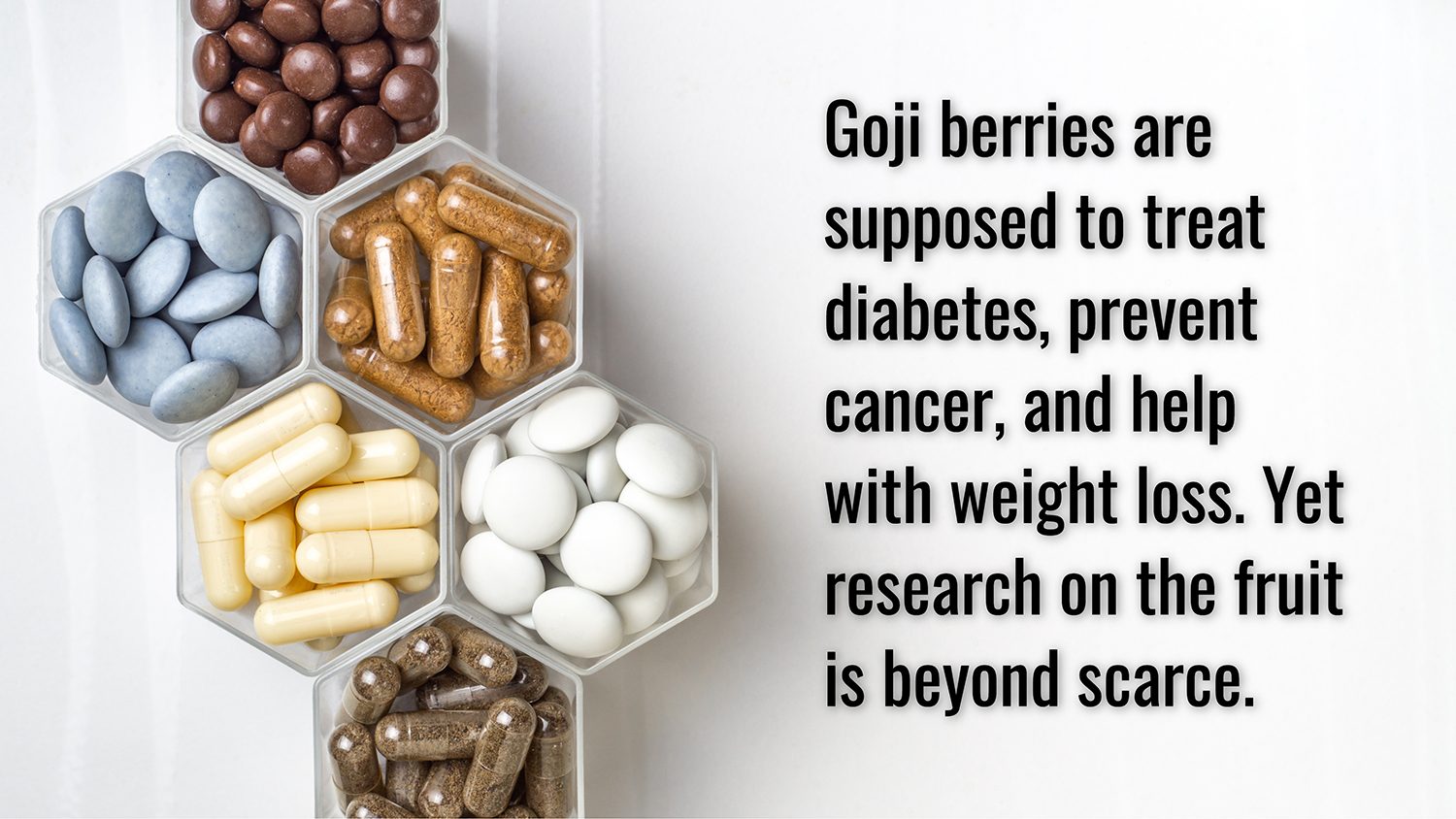
The Truth About Superfood Research
If you are into longevity and health news, you may find it hard to follow all the headlines on superfood discoveries. I certainly do. One day it’s goji berries, the next day it’s matcha. What’s all the rage right now, for example, is leaf powder from an Indian tree called moringa (M. oleifera). It’s loaded with protein and iron, and is supposed to lower cholesterol, protect the cardiovascular system, and reduce inflammation. Hence moringa is being added to everything from nutrition bars and protein powders to juices and chips. Yet I couldn’t find any reliable studies on moringa’s health benefits. As one Canadian researcher has written, “The enthusiasm for the health benefits of M. oleifera is in dire contrast with the scarcity of strong experimental and clinical evidence supporting them.” Same thing with goji berries, also known as the “Himalayan longevity fruit.” Goji berries are supposed to treat diabetes, prevent cancer, and help with weight loss. Yet research on the fruit is beyond scarce. The vast majority of trials have been led by the same person, an employee of a company that produces goji juice. Talk about conflict of interest.
Another alleged miracle food, a yellow spice called turmeric, also doesn’t stand up to scrutiny. Even though there do exist quite a few trials reporting benefits of its chemical component curcumin, most of them are erroneous signals. Curcumin has been classified as belonging to a group of compounds called “pan-assay interference compounds” (PAINS); when scientists screen chemical compounds looking for new drugs, pan-assay interference compounds tend to give false positive results because of their tendency to react with a wide variety of biological targets. A 2017 review published in the Journal of Medicinal Chemistry summed up the supposed miracle properties of curcumin quite simply as “much ado about nothing” and warned that the compound can “trick unprepared researchers into misinterpreting the results of their investigations.” Curcumin is basically a “con artist” of the chemical world, showing false activity in poorly designed studies. So far no double-blinded, placebo-controlled clinical trial involving curcumin has been successful.
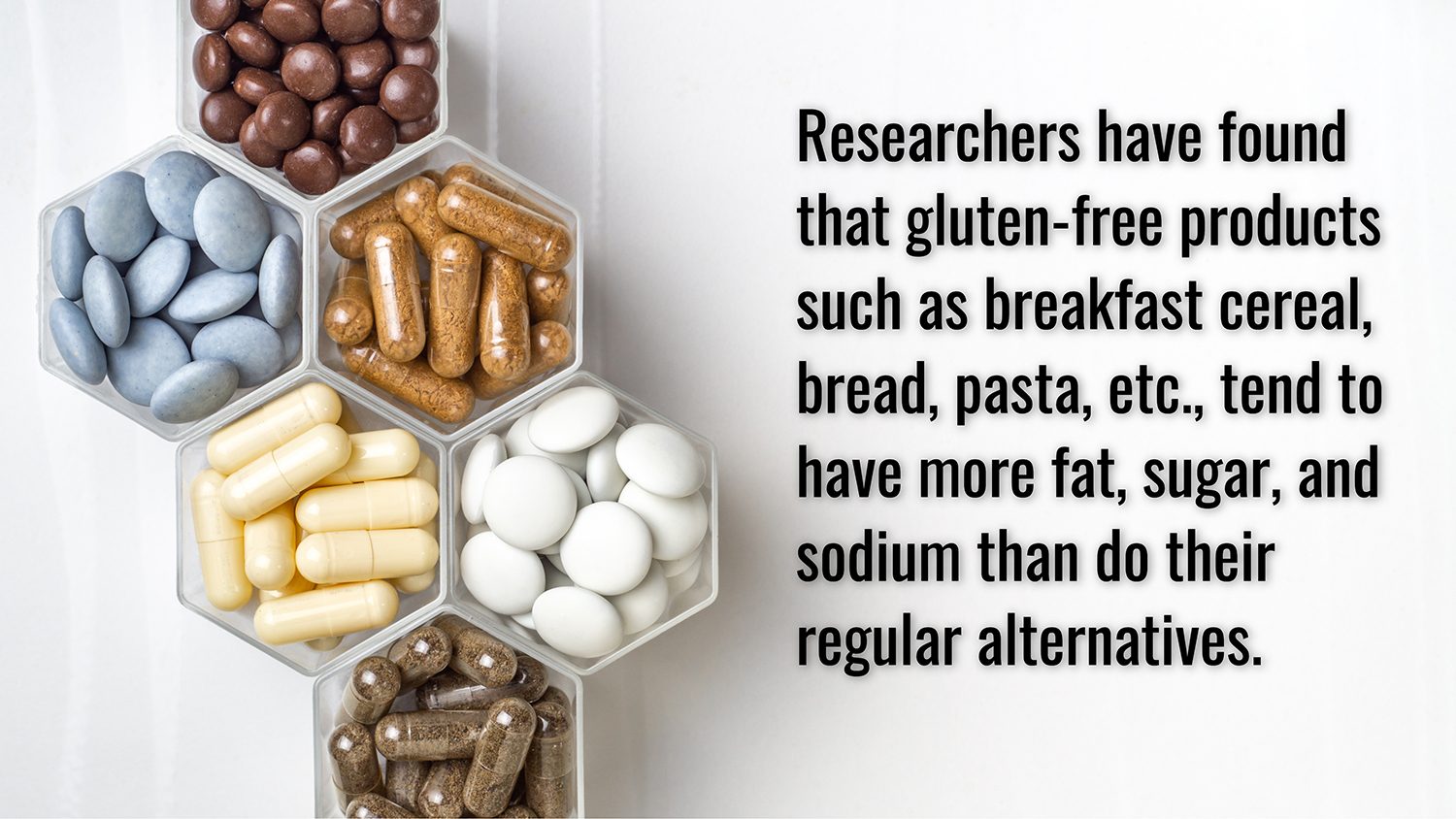
Think Twice About Exclusionary Diets
Just as adding fancy superfoods to your diet may not be the best idea, removing large groups of otherwise healthy products from your menu is also not the way to go if you want to boost your longevity. Even though the prevalence of celiac disease stays well under 1 percent in the US, a quarter of Americans say they avoid gluten. Among those, 35 percent do so for “no reason” other than the belief that gluten-free foods are somehow healthier. They are not. In one investigation of over 1,700 products available on the British market, researchers have found that gluten-free products such as breakfast cereal, bread, pasta, etc., tend to have more fat, sugar, and sodium than do their regular alternatives.
Other research has also found that they contain lower amounts of some vitamins. Instead, they tend to have more heavy metals. Blood and urine samples of people on gluten-free diets reveal they may have 47 percent higher levels of mercury and 80 percent higher levels of arsenic. To make foods without gluten, a great food texturizer, you need to process them more, often spiking them with additives. As a result, epidemiological research shows that people who habitually eat low amounts of gluten tend to have more diabetes and more coronary heart disease than those who eat more of it.
In general, if your diet excludes large numbers of items that are conventionally considered to be nutritious (fruits, vegetables, etc.), there is a good chance this diet is a fad. Before you ask—vegetarianism is not among them. For one, it only eliminates a single type of food, meat; but also, there is a substantial amount of research showing that going meat-free can significantly prolong your life. One study done in California has shown that vegetarians may live longer than others: an average of 9.5 years for men and 6.1 for women. Adding three ounces (85 g) of red meat to your daily diet, above what you normally eat, elevates the risk of death from cardiovascular disease by 16 percent over the next two to three decades of your life. If you exercise every day for 20 minutes to keep your heart healthy, that three ounces of bacon or steak may undo your entire effort.
If gluten-free eating doesn’t make sense for most non-celiac people, if superfoods are not so super after all, and high-protein diets can hurt your longevity, then what should you eat to stay healthy? The answer is, I’m afraid, boring: lots of fruits and veggies. And they don’t have to be exotic—so not rambutan or pitaya, unless you happen to live in southeast Asia. Just cabbage, tomatoes, broccoli, spinach, apples. The cheap, ordinary stuff. And you don’t even have to go organic.
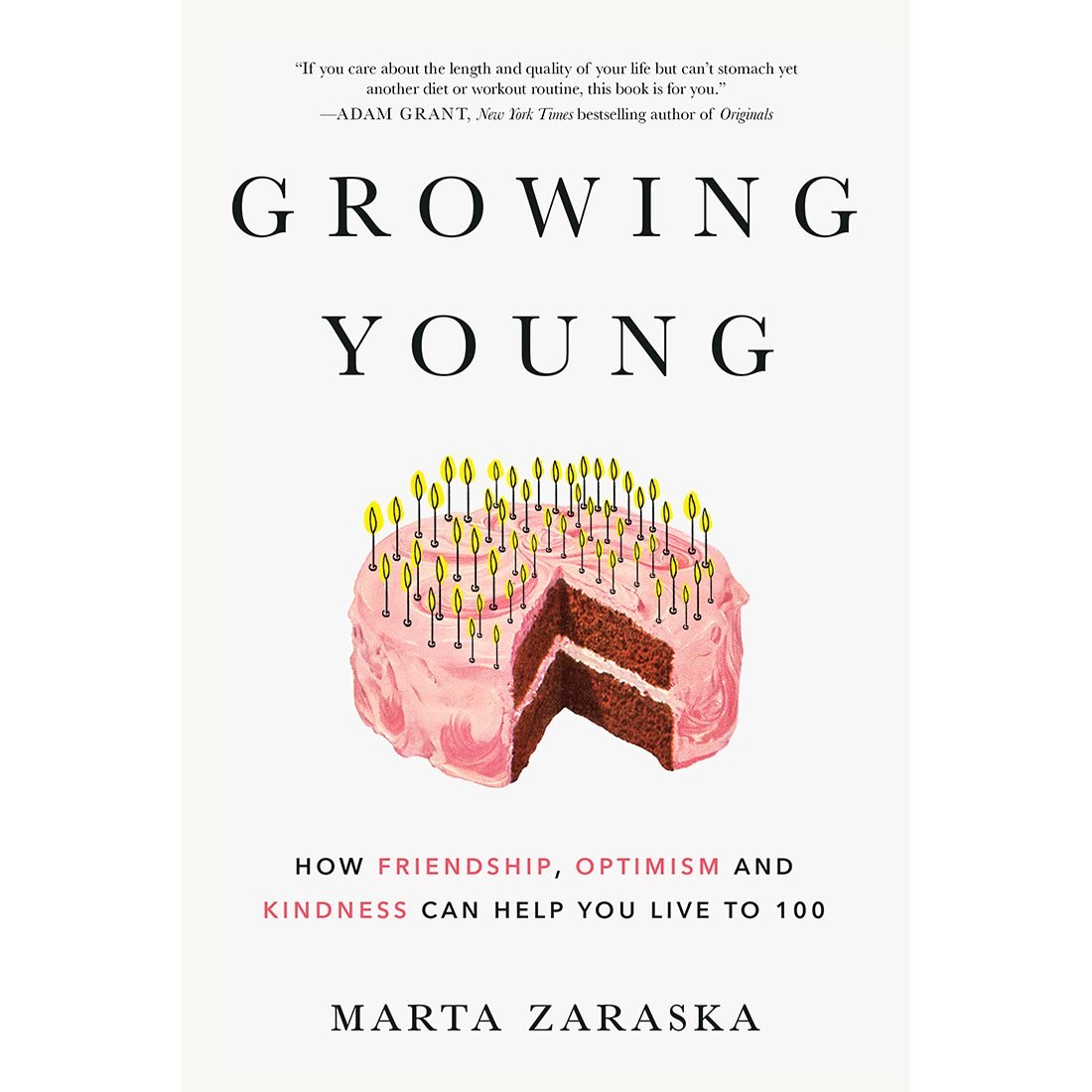
Excerpted from Growing Young: How Friendship, Optimism, and Kindness Can Help You Live to 100 by Marta Zaraska. Copyright © 2020 Marta Zaraska. Published by Appetite by Random House®, a division of Penguin Random House Canada Limited. Reproduced by arrangement with the Publisher. All rights reserved.
Next, check out these expert tips on how to live to 100—and love it!
